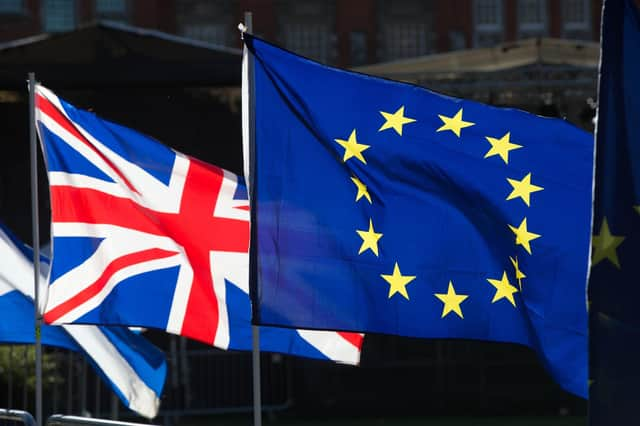Owen Polley: No unionist worth the name would think the constitutional cost of being semi detached from the rest of the UK acceptable, even if there were advantages to it


That was not the first time that the party’s then deputy leader raised the prospect of independence for Northern Ireland. The NIO’s political affairs division noted that, while he was not advocating this outcome in preference to the Union, it was another attempt to get “that option on the agenda”.
This snippet from declassified government files reminds us that there was a strong element within the DUP whose unionism was deeply conditional. It was comfortable with Northern Ireland as a ‘place apart’ from the rest of the United Kingdom.
Advertisement
Hide AdAdvertisement
Hide AdHis dalliance with Ulster nationalism came to mind last week, when Mr Robinson intervened in the debate about the Windsor Framework and restoring Stormont. The former first minister told Times Radio that the DUP could secure, “virtually the best of both worlds with having access in a seamless way to both the UK market and the European market,” by compromising on the Irish Sea border.
The problems with this statement are both factual and constitutional.
The Northern Ireland protocol and the framework exist because the European Union would not grant ‘seamless’ access to the single market unless barriers were erected between our economy and the rest of the UK. If our rules for trading goods are set in Brussels, it will always be costlier and more expensive for GB companies to send products to this province.
That fact was highlighted again by the economist Dr Esmond Birnie, after Northern Ireland was omitted from the chancellor’s plans to create more freeports or ‘investment zones’ on the mainland. In ‘IZs’, the government provides special incentives to businesses to boost growth and investment.
Advertisement
Hide AdAdvertisement
Hide AdAccording to Dr Birnie, Northern Ireland’s exclusion from this initiative is, “A lot to do with the supervision of our economy by the EU under the Windsor Framework.” “If there is some other reason,” he said, “the UK government should explain what that reason is but it looks very likely it is one more consequence of the post-Brexit trading arrangements.”
The idea that we could enjoy ‘the best of both worlds’ under the framework has been mooted frequently, but it’s proved impossible to back up with any firm evidence. The disadvantages are obvious, but the benefits are either theoretical, or come from highly contentious interpretations of trade figures.
By now, the phrase has become so discredited and devalued that it was surprising to hear it used by a unionist leader.
The problem with the protocol and the framework is not that we lack ‘seamless access’ to both Great Britain and the EU, but that we’re shackled to the wrong market and cut off, commercially and politically, from the bulk of our own country. Even if there were advantages to being semi-detached from the rest of the UK, no unionist worth the name would think the constitutional cost acceptable.
Advertisement
Hide AdAdvertisement
Hide AdIf our integral place in the United Kingdom is treated like little more than a financial transaction, we’re half way to accepting that our future will be sold to the highest bidder.
That was the implication too, when the secretary of state claimed that retaining EU laws in Northern Ireland provided an “economic advantage”.
Again, there is little evidence to support this claim and plenty that contradicts it. But why, in any case, would the government exclude the rest of the country from these supposed economic benefits, if they were so appealing?
The News Letter confirmed last week that the European Commission has had no discussions with the government about changing the Windsor Framework or removing aspects of EU law here. That means that, regardless of the outcome of negotiations between ministers and the DUP, Brussels’ regulations, rather than those set at Westminster, will continue to govern our market for goods.
Advertisement
Hide AdAdvertisement
Hide AdThe consequence is that, over time, the two sets of rules are likely to diverge, increasing the cost and complication of doing business between the two jurisdictions and edging Northern Ireland further from the mainstream British economy. You can argue that there may eventually be benefits from that, but you are arguing for a looser, less integrated UK. One in which even the feel of daily life here differs increasingly from Great Britain and becomes closer to the Republic.
Admittedly, while the economic aspect of the Union may be fundamental there are other factors that affect our future in the UK. The argument that support for our constitutional status could be undermined if unionists continue to block Stormont for a long period is hardly outlandish. The DUP is edging toward embracing that case, which is articulated already by the UUP.
That line of thinking does not need to be accompanied, though, by claims that the framework offers advantages that we should embrace, or by playing down the seriousness of the sea border’s effects. Whether or not unionists return to the assembly, you would hope that their long-term goal would remain repairing our trade links with the rest of the UK, not accepting the logic that we should redirect our economy toward the EU single market and the Republic of Ireland.
Then again, that tendency to treat Northern Ireland as an exception to the rest of the UK, to seek preferential treatment and support fundamental differences with Great Britain, remains strong, even though it has consistently undermined the Union.